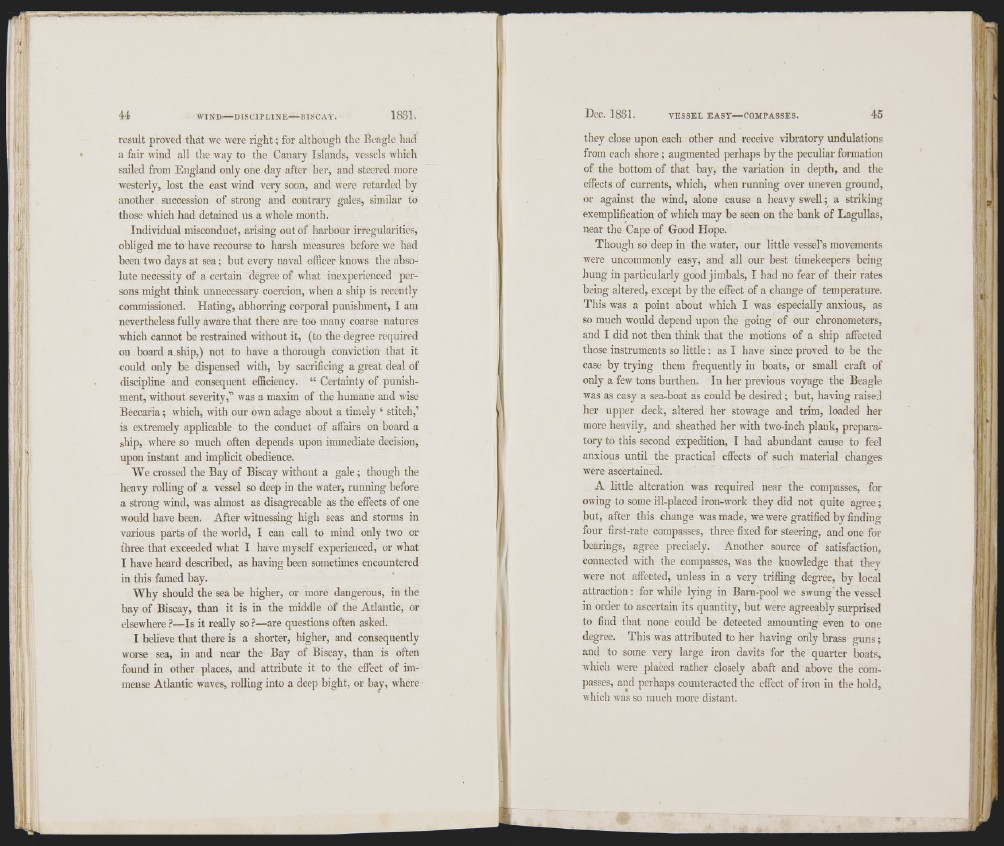
IlM;
i
I-- i’l
44 WIND DISCIPLINE BISCAY. 1831.
result proved that we were rig h t; for although the Beagle had
a fair wind all the way to the Canary Islands, vessels which
sailed from England only one day after her, and steered more
westerly, lost the east wind very soon, and were retai'ded by
another succession of strong and contrary gales, similar to
those which had detained us a whole month.
Individual misconduct, ai-ising out of harbour irregularities,
obliged me to have recourse to harsh measures before we had
been two days at sea; but every naval officer knows the absolute
necessity of a certain degree of what inexperienced persons
might think unnecessary coercion, when a sliip is recently
commissioned. Hating, abhorring corporal punishment, I am
nevertheless fully aware that there are too many coarse natures
which cannot be restrained without it, (to the degree required
on board a ship,) not to have a thorough conviction that it
could only be dispensed with, by sacrificing a great deal of
discipline and consequent efficiency. “ Certainty of punishment,
without severity,” was a maxim of the humane and wise
Beccaria; which, with our own adage about a timely ‘ stitch,’
is extremely applicable to the conduct of affairs on board a
ship, where so much often depends upon immediate decision,
upon instant and implicit obedience.
W e crossed the Bay of Biscay without a gale; though the
heavy rolling of a vessel so deep in the water, running before
a strong wind, was almost as disagreeable as the effects of one
would have been. After witnessing high seas and storms in
various parts of the world, I can call to mind only two or
three that exceeded what I have mj'self experienced, or what
I have heard described, as having been sometimes encountered
in this famed bay.
Why should the sea be higher, or more dangerous, in the
bay of Biscay, than it is in the middle of the Atlantic, or
elsewhere ?—Is it really so ?—are questions often asked.
I believe that there is a shorter, higher, and consequently
worse sea, in and neai- the Bay of Biscay, than is often
found in other places, and attribute it to the effect of immense
Atlantic waves, rolling into a deep bight, or bay, where
il
Dec. 1831. VESSEL EASY COMPASSES. 45
they close upon each other and receive vibratory undulations
from each shore ; augmented perhaps by the peculiar formation
of the bottom of that bay, the variation in depth, and tlie
effects of currents, which, when running over uneven ground,
or against the wind, alone cause a heavy swell; a striking
exemplification of which may he seen on the bank of Lagullas,
near the Cape of Good Hope.
Though so deep in the water, our little vessel’s movements
were uncommonly easy, and all our best timekeepers being
hung in particularly good jimhals, I had no fear of their rates
being altered, except by the effect of a change of temperature.
This was a point about which I was especially anxious, as
so much would depend upon the going of our chronometers,
and I did not then think that the motions of a ship affected
those instruments so little : as I have since proved to be the
case by trying them frequently in boats, or small craft of
only a few tons burthen. In her previous voyage the Beagle
was as easy a sea-boat as could be desired ; but, having raised
her upper deck, altered her stowage and trim, loaded her
more heavily, and sheathed her with two-inch plank, preparatory
to this second expedition, I had abundant cause to feel
anxious until the practical effects of such material changes
were ascertained.
A little alteration was required near the compasses, for
owing to some ill-placed iron-ivork they did not quite agree ;
but, after this change was made, we were gi'atified by finding
four first-rate compasses, three fixed for steering, and one for
bearings, agree precisely. Another source of satisfaction,
connected with the compasses, was the knowdedge that they
were not affected, unless in a very trifling degree, by local
attraction : for while lying in Barn-pool we swung'the vessel
in order to ascertain its quantity, but ivere agreeably surprised
to find that none could be detected amounting even to one
degree. This was attributed to her having only brass guns;
and to some very large iron davits for the quarter boats,
which were placed rather closely abaft and above the compasses,
and perhaps counteracted the effect of iron in the hold,
which was so much more distant. If
•I